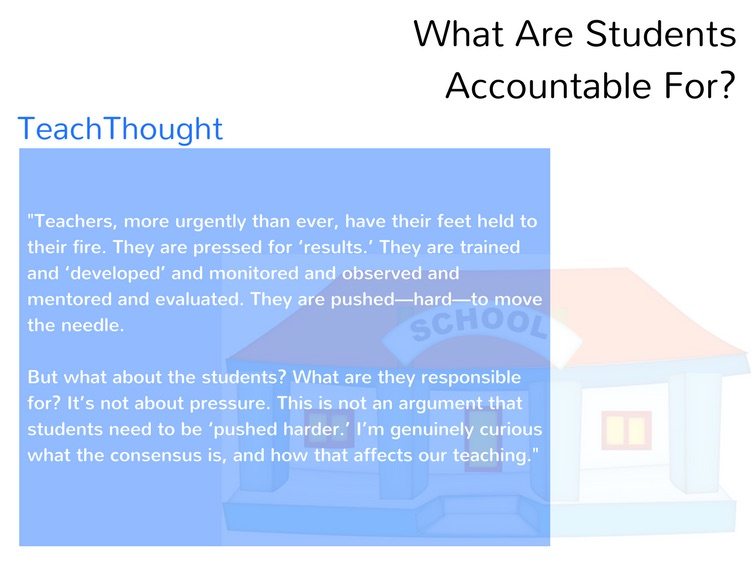
Discussion: What Are Students Responsible For?
by Terry Heick
What are you doing to engage the students?
How are you making sure they pay attention? What are you doing to make them care?
How are you sparking their curiosity? Drawing their attention away from one another? Minimizing distractions?
If a classroom was like a living room, how would you get students to put down their phones and listen to you? Because you know that if you don’t engage them emotionally, you’ll never reach them intellectually.
(I’ve communicated these messages countless times to teachers. See Why Emotion Is More Important Than Understanding for one example. And broadly speaking, I believe they’re true.)
These are common refrains in education, and the underlying assumption of each is the whole point of this post: on a frequent enough basis to merit our collective imploring, students don’t care and it’s the job of teachers to make them care.
Student motivation. Intrinsic vs Extrinsic motivation. The psychology of learning. Brain-based teaching that ‘engages’ students. These are all worth our study as educators. But what about the student? What are they ‘responsible’ for?

What Are Students ‘Responsible’ For?
This is a question that’s crossed my mind countless times since I first stepped foot in a classroom.
Like racial ‘issues,’ technology integration, mainstreaming ECE students, ‘Gifted’ programs, the link between poverty and student achievement, and countless other topics, what students should be ‘accountable’ for is a touchy, touchy topic that there will never be complete agreement about.
Educational is emotional because learning is emotional, and there are few topics that can get a teacher talking faster than students. Their success and need for success. Their behavior and management. Their ‘home life’ and what issues they bring to school. Their kindness and their attitudes. How they conform and how they resist.
Schools are greenhouses, and teachers are horticulturists. Of course, they talk about the plants and flowers and shrubs and saplings. They’re why we’re here. If we can tolerate the metaphor for another moment in order to examine the procedures inherent in the act of teaching, in a greenhouse a horticulturist generally knows how plants will respond to care.
Each plant has an optimal amount of water and direct sunlight. Two plants can respond very differently to the same fertilizer. They may grow more or less in certain years and benefit from unique pH levels. But overall, growing plants is simpler different than ‘growing’ students because the ‘performance’ of plants is (generally) even and consistent.
For every input, there is an extremely predictable output.
That plants don’t have free will is at the center of this consistency. They do what they’re biologically programmed to do with little variance. And though it could be argued that students do exactly the same thing (i.e., that they are ‘programmed’ to resist and compete and lag behind and lead and fail and succeed and so on—another topic for another day), the point here is that we know exactly what to expect from plants but have no idea what to expect from students—or even what’s fair and reasonable to expect of them every time they step foot in the classroom.
So, what is it reasonable to expect of every student? And can we get specific—quantify something, for example? Or should it be vague and abstract, like ‘their best effort.’ Maybe something observable, like ‘Show up to class and listen.’ ‘Don’t distract other students.’ ‘Complete and turn in all work.’
This is generally how we create class rules and school behavior guidelines and are often even a large part of how we grade students, too.
To summarize:
What are students responsible for? Who are they responsible to?
Should we place any kind of ‘responsibility’ on students at all? If so, how can we best communicate that to students, parents, and families to help children grow?
Should it be the same for all students? Can or should it be personalized? If so, how?
Do we even need a unifying vision that works everywhere? That’s the idea behind standardization, and standardization has been guiding ed reform for years now. (Few things get administrators more excited than ‘same page-ness’—all the teachers doing the same things in the same ways as all the other teachers in the other ‘good schools and districts’ that are doing ‘amazing things,’ collaborating in tidy little PLCs all the while.)
What happens when students don’t fulfill those responsibilities? When they don’t ‘meet expectations”? 30 years ago, they might’ve ‘failed.’ Been ‘held back.’ Research says that doesn’t work, so we stopped doing that. So what next? Is there a next?
What sort of intellectual urgency or cultural responsibility or individual accountability should a student feel when they enter a classroom? Maybe none at all? Is it enough to simply hope we can stoke the flames of curiosity, engagement, and inspiration? If so, what can we point to as proof that this approach works for all students and not just one extraordinary school or classroom?
So now I turn it over to you to hear your thoughts and ideas. What are students ‘on the hook’ for?
I look forward to reading your responses.
